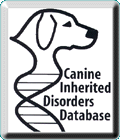
Fold dermatitis/pyoderma
Dermatitis means inflammation of the skin. Where there are excessive skin folds or wrinkles, fold dermatitis occurs due to rubbing of skin and trapping of moisture in the folds. Pyoderma (bacterial skin infection) commonly develops, almost always caused by Staphylococcus intermedius (which does not cause problems in people).
Common forms are tail, lip, and facial fold dermatitis and associated pyoderma, in breeds where there is skin folding in these areas.
Fold dermatitis is directly related to skin folding or wrinkling in a particular breed. The wrinkling trait is considered to be autosomal dominant.
The condition can cause your dog mild to significant discomfort and itching (depending on whether the area becomes infected). Infection is likely to recur.
The condition is readily diagnosed based on reddened, moist areas in folds of skin.
This condition can generally be managed satisfactorily. Your veterinarian will recommend a cleansing shampoo for you to use regularly to combat infection which, when it does occur, will require antibiotic treatment.
If your dog develops a chronic or frequently-recurring fold pyoderma, despite treatment, your veterinarian will likely discuss with you the option of surgically removing the fold which should clear up the problem permanently.
For the veterinarian: Choose cleansers with good residual action but with minimal drying or irritating actions (eg. 0.5% chlorhexidine or 2% benzoyl peroxide).
Fold dermatitis with associated pyoderma is one of the conditions that results from selection by breeders and a demand from the public for particular features, in this case skin wrinkling, heavy facial folds, or a "corkscrew" tail. These disorders are directly related to the conformation or standards for the breed. Although these conditions have in many cases become so common that they are accepted as normal for the breed, they can still cause serious physical problems and discomfort for the dog.
This condition can be minimized by choosing dogs for breeding with few or no wrinkles, rather than those with pronounced folds or wrinkling. Breed clubs can encourage this, while at the same time educating potential owners on the reasons via breed publications/websites.
FOR MORE INFORMATION ABOUT THIS DISORDER, PLEASE SEE YOUR VETERINARIAN.
- (Disorder) related terms:
- Disorder Type:

